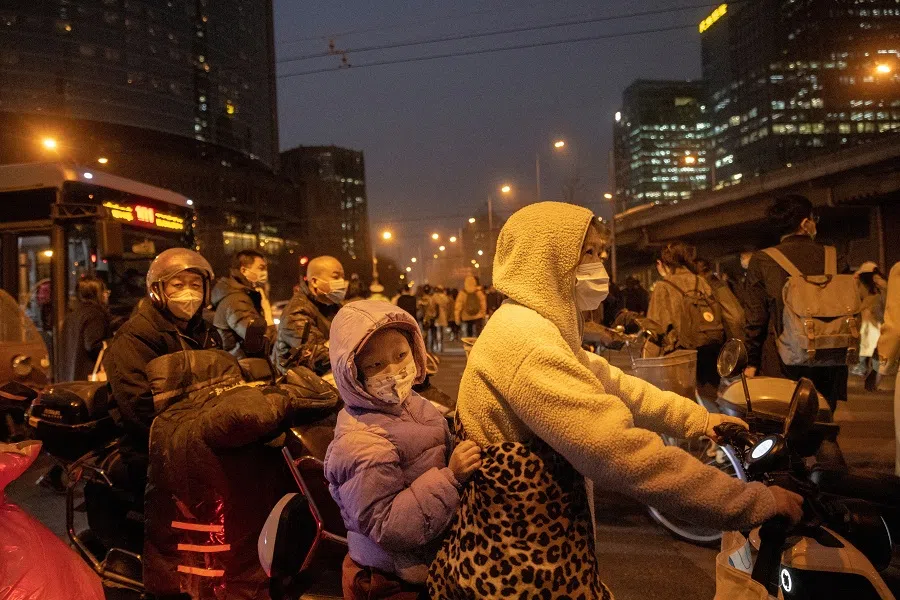Why a sperm bank drive is fuelling fears of infertility in China
The drive in China to get more sperm donations have triggered concerns of a shortfall in supply and rising male infertility rates, but it also plays into the wider national anxiety over a population decline in the country.

(By Caixin journalists Xu Wen, Hu Xueyang, Li Xukui and Wang Xintong)
One February morning, Zhong Ming (pseudonym) stepped into the sperm bank of Beijing's Peking University Third Hospital and was surprised to find the premises packed with men.
Zhong's visit to the facility was his fourth as a donor and the first time he encountered a crowd, including many who appeared to be in their 20s and 30s, the PhD student told Caixin.
The influx comes as sperm banks in multiple provincial-level regions, such as Yunnan, Shaanxi, Beijing and Shanghai, have been calling on healthy men and college students to donate. This follows the country's reopening from Covid-19 curbs, which restricted the collection for a sustained period nationwide.
Sperm banks play a role in helping couples who want kids but can't conceive due to fertility issues or genetic disorders. On the Chinese internet, the drive to get more sperm donations triggered concerns of a shortfall in supply and rising male infertility rates.

But the speculation also plays into the wider national anxiety over a population decline in the country - the first in six decades - that could lead to a continued decline in an already shrinking workforce and take a toll on the economy.
While experts were quick to debunk the concerns over an overall supply shortfall and rising infertility, some highlighted that a regional imbalance in sperm supply still exists and suggested that there should be some rethinking about the role sperm banks play in mitigating China's population decline.
Concerns over lower male fertility
When local media reports picked up the story of a nationwide sperm donation drive, Chinese internet users latched onto the statistic that only 20% of the donors had qualified, prompting chatter about whether men in China are becoming less able to have children.
Data from the sperm bank of the Reproductive & Genetic Hospital of Citic-Xiangya, the largest such facility on the Chinese mainland, showed that the probability of qualified sperm from donors was 17.7% in 2015, a third of what it was in 2006.
The decline in qualified semen can be attributed to the poor habits of college students, who make up the majority of sperm donors - Huang Chuan, Deputy Director of the sperm bank of the Reproductive & Genetic Hospital of Citic-Xiangya

However, experts told Caixin that calls for sperm donations are not evidence of declining male fertility.
Huang Chuan, deputy director of the sperm bank, told Caixin that the drop in the qualified rate does not represent an overall change in sperm quality for all men.
The decline in qualified semen can be attributed to the poor habits of college students, who make up the majority of sperm donors, and it may just be temporary, Huang explained. "This doesn't directly indicate a decline in male sperm quality."
Studies have shown factors that could affect sperm quality include a lack of sleep, smoking, excessive drinking, psychological factors such as work pressure and emotional pressure, and environmental factors such as air pollution.
In addition, Li Fuping, director of the Human Sperm Bank of Sichuan, said that the bar for qualified sperm is set high to begin with as donors must undergo multiple rounds of medical checks. A low rate of qualified donors doesn't reflect that overall male fertility rate is low, Li said.

As for concerns of rising infertility, Zhang Zhichao, chief physician of the department of andrology at Peking University First Hospital, said that the trend could be linked to the growing number of men who are delaying childbirth, which prevents them from having children at an optimal age.
Adequate overall supply
Meanwhile, experts have also rebutted speculation online that China is running out of donated sperm, saying the total amount stored in sperm banks across the country is actually greater than needed.
"Even if we do not take any collections over the next three to five years, the supply [at the sperm bank] is enough," - Zhang Xinzong, Director of the Guangdong Human Spermbank
There's still a large amount of semen stored in China's sperm banks, which can fully meet patients' needs, said Zhang Xinzong, director of the Guangdong Human Spermbank.
Zhang said before 2011, couples who sought the facility for help had to wait in line for a long time, but over the past few years, the supply at the sperm bank has improved significantly and there are now 80,000 donor sperm samples stored. "Even if we do not take any collections over the next three to five years, the supply is enough," he said.

Zhu Wenbing, director of the Citic-Xiangya hospital's sperm bank, said that the national demand for donated sperm "should have reached saturation". The annual utilisation of samples in his sperm bank has dropped by nearly half over the past few years.
Regional imbalance
While experts said that national supply is fine, some flag that imbalances exist regionally, especially in provinces where sperm banks have not been long established or are not large enough. Coupled with the impact of three years of Covid-19 controls that made it difficult for college students to donate semen, the amounts stored in these facilities may be temporarily insufficient.
The experts suggested tackling the issue by facilitating nationwide sperm distribution, which they say could also reduce the risk of getting paired between close relatives. Such pairings have an increased risk of genetic diseases in newborns.
Sperm needs to be stored in liquid nitrogen - which is banned from being carried on airplanes - for transport, Zhang said. Many sperm banks and fertility centres may prefer to use sperm within their own provinces because of the cumbersome process of applying for special permission to transport it, he said.
... the primary role of sperm banks could be shifted from serving infertile couples to preserving the fertility of people.

Human Sperm Bank of Sichuan's Li called on relevant authorities to take the lead in creating a system to facilitate transportation.
Seeking transformation
As China's population ages and shrinks and couples of childbearing age are less willing to have children, industry insiders said the primary role of sperm banks could be shifted from serving infertile couples to preserving the fertility of people.
China currently allows all men to freeze their sperm, and married women to freeze their eggs. But while most sperm banks in the country allow men to store their own sperm there for later use, they face problems such as low participation and low utilisation of these samples, Caixin has learned.
One group that could be targeted to preserve their sperm are cancer patients. Li said it's beneficial for cancer patients to preserve their fertility because cancer treatment can affect their fertility. He also recommends freezing the sperm of healthy men who don't currently want to have children but are concerned about their declining fertility in the future.
Li said in Sichuan province alone, about 5,000 men have undergone fertility preservation, with about 1,000 each year in recent years. Still, there is room for improvement. "We still lack fertility preservation awareness," he said.
This article was first published by Caixin Global as "In Depth: Why a Sperm Bank Drive Is Fueling Fears of Infertility in China". Caixin Global is one of the most respected sources for macroeconomic, financial and business news and information about China.





![[Big read] China’s 10 trillion RMB debt clean-up falls short](https://cassette.sphdigital.com.sg/image/thinkchina/d08cfc72b13782693c25f2fcbf886fa7673723efca260881e7086211b082e66c)